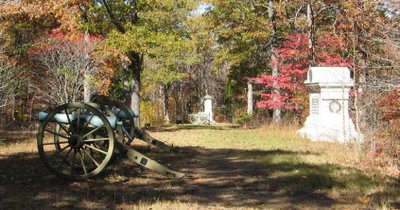
We saw Shiloh, National Military Park, today. It was an extremely interesting, well done and even deeply moving experience. It was a beautiful, bright, sunny but cool day and the fall colors were at their peak here, unlike the spring days of the April, 1862 battles. The battlefields were well marked, well cared for and sometimes filled with monuments erected after the war by various states involved. It’s a National Park, so the park rangers are NPS rangers. They had sold out of the self-led car and walking tour CD at the bookstore so one of the park rangers loaned us a copy of the CD he had. The CD explained the battle and battlefields really well, guiding us away from the normal geographical progression car tour path to many tour points taken in a battle chronology point of view. Actual quotes from battle participant’s memoirs and army records added to the realism and understanding of the significance of this 2 day battle where more American lives were lost than in the entire Revolutionary War, the War of 1812, and the Mexican war. There were 23,746 killed, wounded or missing in action. The bravery and resolve of both sides was stunning, considering that practically none had experienced battle before, and the vagaries of war and pure luck played equal parts with both brilliant and poor military strategy. And yes, Jay, Grant did say "Retreat, No!, I propose to attack at daylight and whip them", and with Buell's army helping, he did so, even after Beauregard had wired home that the Union Army suffered a complete defeat and the Confederacy had won.
The picture is one of “the sunken road”, called the “hornet’s nest” by the Confederates due to the constant buzzing sounds of bullets and shrapnel flying through the air near them. The park, understandably, is the largest collection of actual Civil War cannon in the world.
What wasn’t covered, but what we talked about over and over as we walked these hallowed grounds, was what drove the ordinary men to enlist so eagerly and fight so gallantly for the Union and Confederate sides. Just to say that the South wanted states rights and to preserve a way of life, and the North wanted to preserve the union, is to oversimplify the human dynamics, but we didn’t resolve anything in our discussion today either.
4 comments:
If you have the time, you might want to read James McPherson's book "Battle Cry of Freedom". There are many passages in the book that attemps to explain why both sides fought so hard in the Civil War.
The war had been brewing for many years and their was a deep economic division among the states. As you know, slavery was the foundation for the south's economic system. In addition, slaveholders did not consider themselves to be sinners, but on the contrary southerns believed that slavery was actually good for the slaves and the basis for economic prosperity. The growth of the country made the issue of slavery so explosive.
Thanks. I may read that, and I certainly have time and the inclination to do so.
The discussion we had included the fact that less than 10% of the people in the South owned slaves but almost everybody was in favor of succession. Many of the common people that joined the Confederate Army were those that believed that the Yankees were invading their homeland and wanted to take away their freedoms. The plantation owners that stood to lose the most if slavery were abolished fostered these "fight for your homeland and your freedoms" opinions amoung the farmers and common men in order to gain a more complete loyalty to the cause.
Likewise we felt the common man in the North that joined the Union Army did so not as much to abolish slavery as to preserve the Union for the future of the country.
Slavery was the central cause of the rift between the states, particularly at the government and higher socio-economic levels, but leaders chose to encite the populations with causes they could phrase as the highest ideals that everybody wanted, like "states rights" or "preserve the Union".
Lee:
Such an interesting perspective on these historical events! It is easy to see how some of these are very similar to today's events, and how various causes are "justified" with opinions. We do, indeed, think of the Civil war as one about slavery, but it appears that there were other, more over-riding, issues that burned in people's hearts!
Paul,
I bought that book today, and in the prefaces it says:
But the North did not at first fight to free the slaves. "I have no purpose, directly nor indirectly, to interfere with slavery in the states where it exists" said Lincoln early in the conflict. The Union Congress endorsed this position in July 1861. Within a year, however, both Lincoln and Congress decided to mske emsncipation of the slaves in Confederate states a war policy.
And yes, as you intimate, today men's wills are still bent to support causes by the turn of a cleverly worded phrase, as ever they have been.
Lee
Post a Comment